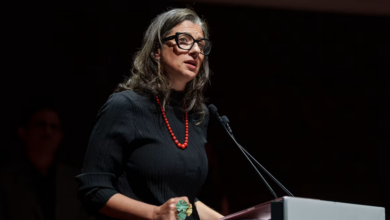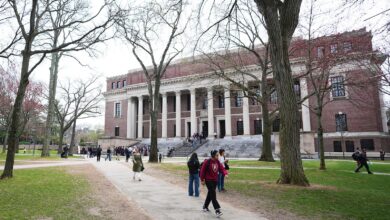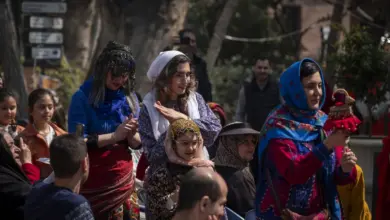The intellectual legacy of scholar and human rights advocate Mohamed Sayed Said was remembered on Sunday when Egyptian intellectuals, academics and human rights activist gathered to commemorate the first anniversary of Said's death.
Said, who died at the age of 59, has been credited with a number of achievements, especially the laying of the theoretical foundations of the Egyptian human rights movement in the early 1980s.
Said, who was born in the coastal city of Port Said in 1950, was also one of the founders of the Egyptian Movement for Change, or "Kefaya," in 2004. He was among very few of the movement's founders to advocate for the promotion of democratic slogans, as opposed to the more nationalistic objectives pursued by other leaders of the movement.
Bahey Eddin Hassan, director of the Cairo Institute for Human Rights Studies (CIHRS), of which Said was a co-founder, praised Said for "establishing the intellectual basis for the human rights movement in Egypt."
According to Hassan, Said, through his establishment of the Egyptian Organization for Human Rights (EOHR), was a human rights pioneer who merged everyday activism with an intellectual effort to bridge the perceived gap between international norms regarding human rights and religious principles.
In the 1980s, Said was among only a few Marxist political activists who tried to enhance the culture of human rights in Egypt by supporting the newly born EOHR, which later became one of Egypt's leading rights groups.
While serving as an EOHR board member in 1989, Said was arrested and tortured due to his vocal condemnation of police brutality and police heavy-handedness against striking workers.
Prominent leftist Abdel-Ghaffar Shoker, vice-president of the Cairo-based Arab Research Center, pointed to Said’s pivotal role in the development of Egypt's nascent democratic movement.
In late 2004, Said had been a chief architect of Kefaya, which became the most visible symbol of Egypt's political opposition for the next couple of years.
“He insisted that all democratic struggles must adopt the western style of democracy, the main axes of which are rule of law, respect for human rights and the independence of the country's religious institutions,” Shoker said.
In 2007, Said took another step forward by providing Egypt's relatively limited journalistic arena with the country's first non-party-affiliated leftist daily, Al-Badeel.
The paper, which soon closed down due to the effects of the global financial crisis, had represented a platform for supporting both the local democracy and human rights movements.
Despite its short lifespan, Al-Badeel, of which Said had been editor-in-chief, quickly became known for tackling traditionally sensitive subjects, including police brutality, corruption and workers' rights.
Along with championing human rights and democracy, Said also contributed heavily in the areas of international relations and cultural analysis.
"He contributed to the field of international relations, particularly in measuring the influence of regional and international power over the Arab regime," said prominent sociologist Al-Sayed Yassin, an adviser to the semi-official Al-Ahram Center for Political and Strategic Studies, at a forum on Sunday organized by the CIHRS.
"He was able to deploy a deep understanding of various academic disciplines in order to critically engage with the real world," Yassin noted.
In 1997, Said edited a major volume entitled, "Progress Initiative: Assimilating Modern Technologies in Egypt," in which he called for Egypt's transformation into a regional hub for the use and adoption of modern technologies.
According to Yassin, Said's "Progress Initiative" constituted "a major contribution to the realm of future studies."
In another major study, "The Future of the Arab Regional System after the Second Gulf War," Said examined the ways in which the changing "world order" was serving to influence the Arab Middle East.
"Said believed that the true intellectual cannot isolate himself from the changing aspects of the world order," Yassin posited. "He took a critical approach to understanding and analyzing global economic, political and cultural debates."
In a series of articles publish in 1994 in the London-based Arabic-language daily Al-Hayat, Said asserted that the role of the intellectual had traditionally revolved around nationalist causes, but often tended to downplay the plight of the Arab world's religious and ethnic minorities and the need to safeguard individual freedoms.
According to Nabil Abdel-Fattah of the Al-Ahram Center for Political and Strategic Studies, "Said's intellectual contribution can be viewed as an open intellectual project that seeks to communicate with other schools of thought that don't necessarily agree with all of Said's arguments."
During his lifetime, Said was a prolific scholar, journalist and author, who, said Abel-Fattah, managed to maintain his independence from the reigning political and social authorities. At a 2005 meeting with President Hosni Mubarak, Said famously took the president to task regarding allegations that the state security apparatus was torturing citizens.
Despite Said's remarkable track record, however, Mustafa Kamal al-Sayed, political science professor at Cairo University, noted that many of the initiatives launched by the late intellectual ultimately proved to be less than successful.
"Kefaya, for example, failed to sustain itself as a broader political opposition platform," he noted. "And Al-Badeel newspaper proved unable to achieve self-sufficiency."
"But this doesn't mean his larger project, which was always open to self-criticism, can be deemed a failure," al-Sayed added. "Our task now is to augment his efforts and engage critically with his living intellectual and political work."




